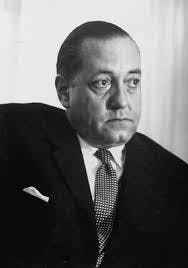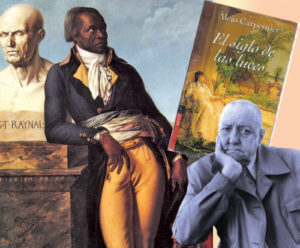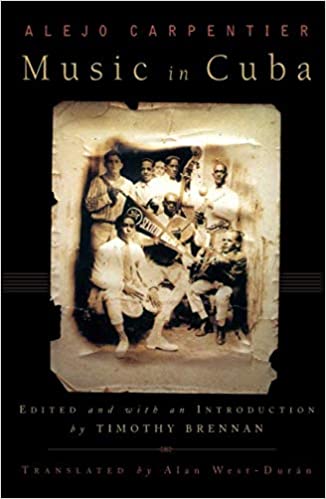 ALEJO CARPENTIER, NOVELISTA, ENSAYISTA Y MUSICOLOGO. APARECE SU MALETA PERDIDA.
ALEJO CARPENTIER, NOVELISTA, ENSAYISTA Y MUSICOLOGO. APARECE SU MALETA PERDIDA.
Alejo Carpentier y Valmont nació en Lausana, Suiza un 26 de diciembre de 1904 y creció en La Habana, Cuba, a pesar de su lugar de nacimiento europeo, se identificó fuertemente como cubano a lo largo de su vida.
Fue un novelista, ensayista y musicólogo que influyó mucho en la literatura latinoamericana durante su famoso período de “auge”. Viajó extensamente, particularmente en Francia, y en América del Sur y México, donde se reunió con destacados miembros de la comunidad cultural y artística latinoamericana. Carpentier se interesó mucho en la política latinoamericana y a menudo se alineó con movimientos revolucionarios.
Aunque Carpentier escribió en una miríada de géneros, como periodismo, drama de radio, dramaturgia, ensayos académicos, ópera y libreto, es mejor conocido por sus novelas.
Fue uno de los primeros practicantes del realismo mágico que utilizó la técnica, lo realmente maravilloso para explorar la fantástica calidad de la historia y la cultura latinoamericanas. El ejemplo más famoso de la influencia afrocubana y el uso de lo real maravilloso es la novela de 1949 de Carpentier ‘El reino de este mundo’ sobre la revolución haitiana de finales del siglo XVIII.
Una enorme maleta que se deshizo al ser suspendida, atesoraba en Francia pertenencias valiosas de Alejo Carpentier Valmont entre ellas textos originales de materiales publicados, y originales sin publicar; cartas íntimas sobre su vida familiar y obras de arte.
Su dueño, Alejo, la dejó en la casa de huéspedes donde vivía en París y viajó a Cuba. Poco tiempo después estalló la Segunda Guerra Mundial. El creador de la teoría de lo real maravilloso la daría por perdida.
Pero un día Lilia Esteban de Carpentier, su esposa, ya viuda, recibió una nota procedente de París. Se le anunciaba que en un ático, enclavado en una zona rural, había aparecido una maleta con un tesoro para la radio.
La había hallado un pariente de los dueños de la casa en cuestión, que era un profesional de la radio francesa, y decía que la maleta perdida había pertenecido a «Alexis», con ese nombre conocían al presunto propietario del tesoro, al huésped que la dejó a guardar.
Lilia debía ir a reconocer ese material diverso que contenía la vieja maleta, porque los parientes de las propietarias del ático donde estaba guardada, decían que por su contenido podía ser propiedad de Alejo Carpentier, quien había vivido en París en aquel momento y luego, se le conoció como escritor y diplomático en la embajada de Cuba en París.
Lilia dio fe absoluta de que todo lo hallado en la maleta que se deshizo al levantarla y abrirla, había sido propiedad de Alejo, su esposo, ya fallecido nueve años antes del hallazgo.
Qué tenía la maleta? Desde un recorte de periódico que da fe de la muerte, junto al héroe Sandino, de un cubano, hasta obras maestras de la pintura y una hermosa colección de cartas a famosos intelectuales; así como inconclusas obras del autor, entre otras, de ‘El siglo de las luces’, las que le valieron el Premio Cervantes en 1978 (primer latinoamericano en recibirlo), y que de seguro lo habrían hecho candidato al Nobel de Literatura, de no haber fallecido dos años después de merecer el Cervantes.
Entre las pertenencias del escritor se encontro una carta de él a su madre «Toutouche» (Lina Valmont), vísperas de la Segunda Guerra Mundial. En ella dice: «Nunca podrás imaginarte la tristeza enorme que me causó esa carta ¡es una verdadera tragedia! Tu mudada, sobre todo, es algo terrible. ¿Es decir que por seis pesos, no pudiste seguir viviendo con la gente que te quería y cuidaba? ¿Y vives ahora en un cuarto de doce pesos?… «Toutouche, es absolutamente inútil seguir ilusionado: yo no puedo seguir viviendo en Europa. Esto tiene que acabar. Desde ahora mismo voy a comenzar a arreglar mi viaje de regreso».
Alejo Carpentier murió en Paris el 24 de Abril de 1980 y fue enterrado en el Cementerio de Colón en la Habana.
 ALEJO CARPENTIER, NOVELIST, ESSAYIST AND MUSICOLOGIST. APPEARED HIS LOST SUITCASE.
ALEJO CARPENTIER, NOVELIST, ESSAYIST AND MUSICOLOGIST. APPEARED HIS LOST SUITCASE.
Alejo Carpentier y Valmont was born in Lausanne, Switzerland on December 26, 1904, and grew up in Havana, Cuba, despite his European birthplace, he strongly identified himself as Cuban throughout his life.
He was a novelist, essayist, and musicologist who greatly influenced Latin American literature during his famous “boom” period. He traveled extensively, particularly in France, and in South America and Mexico, where he met with prominent members of the Latin American cultural and artistic community. Carpentier became very interested in Latin American politics and often aligned himself with revolutionary movements.
Although Carpentier wrote in a myriad of genres, including journalism, radio drama, playwriting, academic essays, opera, and libretto, he is best known for his novels.
He was one of the first practitioners of magical realism who used the technique, the truly wonderful thing, to explore the fantastic quality of Latin American history and culture. The most famous example of Afro-Cuban influence and the use of the marvelous real is Carpentier’s 1949 novel ‘The Kingdom of this World’ about the Haitian revolution of the late eighteenth century.
An enormous suitcase that fell apart when suspended, housed in France valuable belongings of Alejo Carpentier Valmont, including original texts of published materials, and unpublished originals; Intimate letters about his family life and works of art.
Her owner, Alejo, left her at the guest house where she lived in Paris and traveled to Cuba. A short time later, World War II broke out. The creator of the theory of the wonderful real would give it up for lost.
But one day Lilia Esteban de Carpentier, his wife, already a widow, received a note from Paris. He was told that a suitcase with a treasure for the radio had appeared in an attic, located in a rural area.
It had been found by a relative of the owners of the house in question, who was a professional of the French radio, and said that the lost suitcase had belonged to “Alexis”, with that name they knew the alleged owner of the treasure, the guest who left to save.
Lilia had to go and recognize that diverse material that the old suitcase contained, because the relatives of the owners of the attic where it was kept, said that because of its content it could be owned by Alejo Carpentier, who had lived in Paris at that time and then, he met him as a writer and diplomat at the Cuban embassy in Paris.
Lilia gave absolute faith that everything found in the suitcase that fell apart when she picked it up and opened it, had been the property of Alejo, her husband, who had died nine years before the discovery.
What did the suitcase have? From a newspaper clipping that attests to death, along with the Cuban hero Sandino, to masterpieces of painting and a beautiful collection of letters to famous intellectuals; as well as unfinished works by the author, among others, from ‘The century of lights’, which earned him the Cervantes Prize in 1978 (the first Latin American to receive it), and which surely would have made him a candidate for the Nobel Prize for Literature, if not having died two years after deserving the Cervantes.
Among the writer’s belongings was a letter from him to his mother “Toutouche” (Lina Valmont), on the eve of World War II. In it she says: «You can never imagine the enormous sadness that this letter caused me. It is a real tragedy! Your move, especially, is something terrible. That is to say that for six pesos, you could not continue living with the people who loved and cared for you? And now you live in a quarter of twelve pesos? … «Toutouche, it is absolutely useless to continue to be excited: I cannot continue living in Europe. This has to end. From now on I am going to start to arrange my return trip ».
Alejo Carpentier died in Paris on April 24, 1980, and was buried in the Colón Cemetery in Havana.
Agencies/ Wiki/ RHC/ Marta Rojas/ Lorena Viñas/ Extractos/ Excerpts/ Arnoldo Varona/ www.TheCubanHhistory.com
THE CUBAN HISTORY, HOLLYWOOD.








